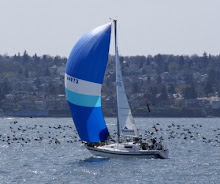 The Douglas' Squirrel, or Tamiasciurus douglasii, is also known as the Chickaree. It's a cute little squirrel I've seen on many visits to Vancouver's Stanley Park. Some have even followed along behind me on forest trails. It's a pine squirrel native to the Pacific Northwest from the Sierra Nevada Mountains of California to coastal British Columbia west of the Cascade Mountains. This animal, a member of the Rodentia family, varies in length from 25-35 cm (including the tail) and weighs from 150-275 grams. It lives in coniferous forests preferring old-growth and mature second growth forests. In the summer time they sleep in ball-shaped nests in trees but in winter use holes in trees as nests. Their diet consists mostly of seeds from various coniferous trees such as Douglas Fir, Sitka Spruce and Pine but they also eat acorns, berries, mushrooms and the eggs of the Yellow Warbler, Dendroica petechia. They bury their food in a single place called a 'midden.' The Douglas' Squirrel does have predators such as American Martins, Bobcats, domestic cats, Northern Goshawks and Owls. The human threat is from the destruction of old-growth forests though they are unaffected by commercial thinning of forests. This is a cute little animal that you are sure to spot if you ever visit Stanley Park in Vancouver, BC.
The Douglas' Squirrel, or Tamiasciurus douglasii, is also known as the Chickaree. It's a cute little squirrel I've seen on many visits to Vancouver's Stanley Park. Some have even followed along behind me on forest trails. It's a pine squirrel native to the Pacific Northwest from the Sierra Nevada Mountains of California to coastal British Columbia west of the Cascade Mountains. This animal, a member of the Rodentia family, varies in length from 25-35 cm (including the tail) and weighs from 150-275 grams. It lives in coniferous forests preferring old-growth and mature second growth forests. In the summer time they sleep in ball-shaped nests in trees but in winter use holes in trees as nests. Their diet consists mostly of seeds from various coniferous trees such as Douglas Fir, Sitka Spruce and Pine but they also eat acorns, berries, mushrooms and the eggs of the Yellow Warbler, Dendroica petechia. They bury their food in a single place called a 'midden.' The Douglas' Squirrel does have predators such as American Martins, Bobcats, domestic cats, Northern Goshawks and Owls. The human threat is from the destruction of old-growth forests though they are unaffected by commercial thinning of forests. This is a cute little animal that you are sure to spot if you ever visit Stanley Park in Vancouver, BC.
Wednesday, July 18, 2007
The Douglas' Squirrel
 The Douglas' Squirrel, or Tamiasciurus douglasii, is also known as the Chickaree. It's a cute little squirrel I've seen on many visits to Vancouver's Stanley Park. Some have even followed along behind me on forest trails. It's a pine squirrel native to the Pacific Northwest from the Sierra Nevada Mountains of California to coastal British Columbia west of the Cascade Mountains. This animal, a member of the Rodentia family, varies in length from 25-35 cm (including the tail) and weighs from 150-275 grams. It lives in coniferous forests preferring old-growth and mature second growth forests. In the summer time they sleep in ball-shaped nests in trees but in winter use holes in trees as nests. Their diet consists mostly of seeds from various coniferous trees such as Douglas Fir, Sitka Spruce and Pine but they also eat acorns, berries, mushrooms and the eggs of the Yellow Warbler, Dendroica petechia. They bury their food in a single place called a 'midden.' The Douglas' Squirrel does have predators such as American Martins, Bobcats, domestic cats, Northern Goshawks and Owls. The human threat is from the destruction of old-growth forests though they are unaffected by commercial thinning of forests. This is a cute little animal that you are sure to spot if you ever visit Stanley Park in Vancouver, BC.
The Douglas' Squirrel, or Tamiasciurus douglasii, is also known as the Chickaree. It's a cute little squirrel I've seen on many visits to Vancouver's Stanley Park. Some have even followed along behind me on forest trails. It's a pine squirrel native to the Pacific Northwest from the Sierra Nevada Mountains of California to coastal British Columbia west of the Cascade Mountains. This animal, a member of the Rodentia family, varies in length from 25-35 cm (including the tail) and weighs from 150-275 grams. It lives in coniferous forests preferring old-growth and mature second growth forests. In the summer time they sleep in ball-shaped nests in trees but in winter use holes in trees as nests. Their diet consists mostly of seeds from various coniferous trees such as Douglas Fir, Sitka Spruce and Pine but they also eat acorns, berries, mushrooms and the eggs of the Yellow Warbler, Dendroica petechia. They bury their food in a single place called a 'midden.' The Douglas' Squirrel does have predators such as American Martins, Bobcats, domestic cats, Northern Goshawks and Owls. The human threat is from the destruction of old-growth forests though they are unaffected by commercial thinning of forests. This is a cute little animal that you are sure to spot if you ever visit Stanley Park in Vancouver, BC.
Subscribe to:
Post Comments (Atom)

No comments:
Post a Comment